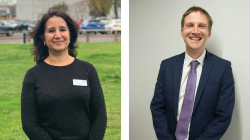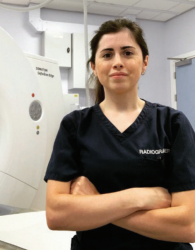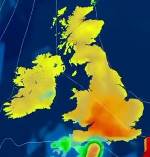Monthly archives: July 2022
SWB NHS Trust Chair Sir David Nicholson takes on additional role as chair of Dudley Group NHS Foundation Trust

Dudley Group NHS Foundation Trust have appointed Sir David Nicholson as their new Trust chair, following the announcement that the current chair, Dame Yve Buckland, will leave the role in September 2022.
This new appointment means that our Trust and Dudley Group will have a shared Chair, which comes at a time when the NHS is integrating services and collaborating to restore services for our patients. The arrangement may bring further opportunities for collaboration and partnership as our Trusts continue to work together, with others in the system, as part of the Black Country Provider Collaborative.
Sir David will be moving on from his role as chair of Worcestershire Acute Hospitals NHS Trust in order to focus on his leadership of the two Trust Boards in the Black Country.
Sir David Nicholson said, “I am really looking forward to joining Dudley Group as their chairman and I am keen to get the very best for the people of Dudley and Sandwell through even closer working across the two organisations. The Trusts have already been working closely together on a number of things, such as procurement, for many years and I want to strengthen that even more.”
Update to COVID-19 terms and conditions: Joint letter to all colleagues from the Trust and Staff Side
On 21 February, the government set out their plans for living with COVID-19 which saw the withdrawal of legislation restricting public freedoms.
On 13 April 2022 the Department of Health and Social Care (DHSC) wrote to the joint chairs of the NHS Staff Council setting out their intention to withdraw the staff terms and conditions section of the COVID-19 workforce guidance. The Staff Council co-chairs received confirmation from the DHSC on 29 June 2022 outlining the timeline to withdraw the guidance.
The withdrawal of the guidance will see a return to normal contractual arrangements for staff and includes the removal of:
a. COVID-19 sick pay (full pay) for COVID-19 related sickness absences; and
b. COVID-19 special leave (full pay) for self-isolation
All remaining temporary enhancements within the guidance ended on 7 July 2022
Managing infection control
- From 7 July 2022 the Trust started to follow infection control guidelines set out by the UK Health Protection Agency(UKHSA), for all healthcare staff. This includes staff who test positive for COVID-19 and those who are required to stay away from their workplace.
- If a member of staff is either asymptomatic or symptomatic but clinically well enough to work, they will be required to stay away from their workplace. In such cases the staff member will receive the pay they would receive if they were at work. This is regardless of whether the staff member can work from home, including on altered duties or not, during this period. This period of absence will be treated as authorised absence, not sickness absence.
- Where possible, SWB will facilitate staff members to work from home where they have tested positive for COVID-19 or where, in line with the UKHSA guidance, their risk assessment deems it is not suitable for them to be physically present at work. In such circumstances it may be appropriate for managers to consider reallocating duties for a staff member to facilitate home working.
What does this mean for me?
- If you are currently off work due to COVID related symptoms and have been on long term leave as a result, your manager, or another member of the management team, will meet with you over the next few weeks (either virtually or face to face) to discuss how this affects you. If you are a member of a Union, we strongly encourage you to seek their support at this meeting and beyond. After the meeting you will receive a letter from the manager outlining what was discussed and also formally confirming notice of withdrawal of the staff terms and conditions section of the COVID-19 workforce guidance. This means that any ongoing sickness leave from 1 September 2022, will be managed by the Trust absence policy Attendance-at-Work-Sickness-Absense-Policy.pdf (swbh.nhs.uk)
- What will happen with regards to payments for sickness? All sickness periods that have been treated as COVID-19 sickness and have not been counted towards normal sickness absence (in relation to pay and/or sickness absence triggers) until 1 September, should retain that status. After 1 September 2022 this will be disregarded when calculating sick pay.
- What if I need to self-isolate in line with the UKHSA guidance? You will be supported to work from home in the first instance wherever possible. Where this is not possible, you will be on ‘authorised absence’ and receive full pay as if at work. This will not be treated as sickness absence.
- What happens if staff are required to stay away from the workplace in line with infection control and public health advice? Substantive staff who are clinically well but have a positive COVID-19 test or symptoms of a respiratory infection which require them to stay away from the workplace in line with UKHSA guidance should be given work they can complete remotely. Where this is not possible, they should receive confirmation that the time they spend away from work will be recorded as authorised absence (not sickness absence) and they will receive their full pay.
The Trust and the Trade Unions have not made this decision independently and we are following the guidance as issued by NHS Employers. For those who are directly affected we urge you to meet with your managers alongside your Trade Union representation where requested to do so. Details of Unions and Representatives can be found on Connect. Or you can email the confidential Staff side collective email on swbh.unioncollective@nhs.net . For those not in a Union, you may contact Simon Morley our Trust Staff Side Convenor on Simon.morley1@nhs.net for advice and support.
A frequently asked questions sheet will be issued shortly to answer any questions you have or to reflect any issues already raised. You can read the COVID-19: NHS Staff joint council guidance here.
Frieza Mahmood, Chief People Officer
Simon Morley, Trust Convenor
All managers should ensure that staff have seen this communication, especially those who may not access the intranet within the next 7-10 days. Roster users and managers will be contacted directly with guidance on any changes to processes. Attached is the guidance on recording absences on ESR.
Living with COVID-19 Bulletin: Thursday 21 July
1. Update to COVID-19 terms and conditions: Joint letter to all colleagues from the Trust and Staff Side
On 21 February, the government set out their plans for living with COVID-19 which saw the withdrawal of legislation restricting public freedoms.
On 13 April 2022 the Department of Health and Social Care (DHSC) wrote to the joint chairs of the NHS Staff Council setting out their intention to withdraw the staff terms and conditions section of the COVID-19 workforce guidance. The Staff Council co-chairs received confirmation from the DHSC on 29 June 2022 outlining the timeline to withdraw the guidance.
The withdrawal of the guidance will see a return to normal contractual arrangements for staff and includes the removal of:
a. COVID-19 sick pay (full pay) for COVID-19 related sickness absences; and
b. COVID-19 special leave (full pay) for self-isolation
All remaining temporary enhancements within the guidance ended on 7 July 2022
Managing infection control
- From 7 July 2022 the Trust started to follow infection control guidelines set out by the UK Health Protection Agency(UKHSA), for all healthcare staff. This includes staff who test positive for COVID-19 and those who are required to stay away from their workplace.
- If a member of staff is either asymptomatic or symptomatic but clinically well enough to work, they will be required to stay away from their workplace. In such cases the staff member will receive the pay they would receive if they were at work. This is regardless of whether the staff member can work from home, including on altered duties or not, during this period. This period of absence will be treated as authorised absence, not sickness absence.
- Where possible, SWB will facilitate staff members to work from home where they have tested positive for COVID-19 or where, in line with the UKHSA guidance, their risk assessment deems it is not suitable for them to be physically present at work. In such circumstances it may be appropriate for managers to consider reallocating duties for a staff member to facilitate home working.
What does this mean for me?
- If you are currently off work due to COVID related symptoms and have been on long term leave as a result, your manager, or another member of the management team, will meet with you over the next few weeks (either virtually or face to face) to discuss how this affects you. If you are a member of a Union, we strongly encourage you to seek their support at this meeting and beyond. After the meeting you will receive a letter from the manager outlining what was discussed and also formally confirming notice of withdrawal of the staff terms and conditions section of the COVID-19 workforce guidance. This means that any ongoing sickness leave from 1 September 2022, will be managed by the Trust absence policy Attendance-at-Work-Sickness-Absense-Policy.pdf (swbh.nhs.uk)
- What will happen with regards to payments for sickness? All sickness periods that have been treated as COVID-19 sickness and have not been counted towards normal sickness absence (in relation to pay and/or sickness absence triggers) until 1 September, should retain that status. After 1 September 2022 this will be disregarded when calculating sick pay.
- What if I need to self-isolate in line with the UKHSA guidance? You will be supported to work from home in the first instance wherever possible. Where this is not possible, you will be on ‘authorised absence’ and receive full pay as if at work. This will not be treated as sickness absence.
- What happens if staff are required to stay away from the workplace in line with infection control and public health advice? Substantive staff who are clinically well but have a positive COVID-19 test or symptoms of a respiratory infection which require them to stay away from the workplace in line with UKHSA guidance should be given work they can complete remotely. Where this is not possible, they should receive confirmation that the time they spend away from work will be recorded as authorised absence (not sickness absence) and they will receive their full pay.
The Trust and the Trade Unions have not made this decision independently and we are following the guidance as issued by NHS Employers. For those who are directly affected we urge you to meet with your managers alongside your Trade Union representation where requested to do so. Details of Unions and Representatives can be found on Connect. Or you can email the confidential Staff side collective email on swbh.unioncollective@nhs.net . For those not in a Union, you may contact Simon Morley our Trust Staff Side Convenor on Simon.morley1@nhs.net for advice and support.
A frequently asked questions sheet will be issued shortly to answer any questions you have or to reflect any issues already raised. You can read the COVID-19: NHS Staff joint council guidance here.
Frieza Mahmood, Chief People Officer
Simon Morley, Trust Convenor
All managers should ensure that staff have seen this communication, especially those who may not access the intranet within the next 7-10 days. Roster users and managers will be contacted directly with guidance on any changes to processes. Attached is the guidance on recording absences on ESR.
2. New process for documenting patient lateral flow results
 Colleagues who are carrying out patient lateral flow tests must ensure they document results using the newly launched form available on Unity with immediate effect.
Colleagues who are carrying out patient lateral flow tests must ensure they document results using the newly launched form available on Unity with immediate effect.
The new form has structured fields which allow colleagues to accurately record results including the time and date tests were carried out and the symptom status of the patient. This also ensures that Infection Control are able to track, trace and manage outbreaks and incidents with greater accuracy.
The new LFT result recording form can be found on Unity simply by accessing the patient record and then clicking on the ‘Adhoc’ button , followed by selecting the ‘Assessment’ folder and selecting ‘Lateral Flow Test Form’ from the list of documents.
Full details on how to find the LFT record form, input results and review results can be found in the following QRG: Documenting Lateral Flow Tests QRG
3. Masks are required in all indoor spaces
Due to a rise in cases of COVID-19 within the community, in our hospitals and among our workforce, we have reintroduced fluid resistant surgical masks (FRSMs) as a minimum level of PPE in all indoor spaces and areas, this includes clinical and non-clinical areas.
Where face to face meetings need to take place, please ensure that masks are worn and that social distancing measures of at least one metre are in place.
Being cautious keeps us safe:
With rising cases of COVID-19, it is clear that we must remain cautious to avoid transmission of COVID-19, in particular to protect vulnerable colleagues and patients. Please ensure that you adopt safe practices and follow our IPC guidance including hand hygiene, PPE and be mindful of social distancing.
Our IPC arrangements continue to be reviewed weekly based on community case rates, hospital outbreaks, inpatient numbers and staff absence due to COVID-19.
Social distancing:
Please consider, where possible, social distancing measures to keep a minimum of 1 metre between you and those around you.
Face masks:
Colleagues and patients are also required to ensure they wear masks in clinical areas and communal areas in our hospital buildings. Colleagues are reminded to ensure they follow the correct PPE guidance when in direct contact with patients. You must also follow your individual risk assessment for PPE. Occasionally this will recommend a higher level of protection depending on your individual assessment.
If you see someone not wearing a mask where they should be, please respectfully challenge them.
Hand washing:
This is an essential part of infection, prevention and control. All colleagues must wash their hands and or use hand sanitiser frequently and always on entering and exiting clinical areas.
Bare below the elbow:
Please ensure that you are bare below the elbow whilst in clinical areas. This means your sleeves must be rolled up and any wrist jewellery should be removed prior to entering the area.
Coats and bags:
Outdoor coats should be removed prior to entering a clinical area and should be placed along with bags in lockers. They should not be taken into the main ward area. Handbags should not to be taken on ward rounds.
IT service desk now available on MS Teams
 Waiting on the phone when you’re in desperate need of IT support can be frustrating, especially if you hit problems first thing in the morning when the service is busiest. But you will be pleased to know you can have an IT expert on hand in a matter of moments if you use the newly launched live chat function.
Waiting on the phone when you’re in desperate need of IT support can be frustrating, especially if you hit problems first thing in the morning when the service is busiest. But you will be pleased to know you can have an IT expert on hand in a matter of moments if you use the newly launched live chat function.
If you need some help and advice from the IT service desk, simply open MS Teams and search for ‘Service Desk Live Chat’, or alternatively, bookmark the link below.
Chat with the IT Service Desk.
The new live chat function does not replace other means to contact IT, colleagues can still phone the department on ext. 4050 or walk-in to the department.
Domestic Abuse Act Statutory Guidance
The Domestic Abuse Act Statutory Guidance has recently been published. This statutory guidance is issued under section 84 of the Domestic Abuse Act 2021 (‘the 2021 Act’). It is intended to increase awareness and inform the response to domestic abuse. It also conveys standards and promotes best practice.
We ask that colleagues familiarise themselves the latest guidance.
To view the document, please click here.
Learning from deaths bulletin – drug Induced Bradycardia: Issue 13

Issue 13 of the learning from deaths bulletin is now available. This Issue covers a 88 year old male admitted with drug induced bradycardia and delirium. He was on a combination of medications in the community (atenolol and diltiazem) which are known to cause bradycardia (slow heartbeat), which can on occasion be profound.
These bulletins provide a valuable learning resource for colleagues to review and understand cases where opportunities for treatment have been missed, ensuring that we are able to learn and develop our care practices.
Click here to find out what lessons were learnt.
Relaxed uniform policy due to hot weather extended until 21 July, 7pm
Due to the continued hot weather we have made the decision to extend the relaxation of the uniform policy. At all times, please use common sense and ensure your clothing is professional, clean, safe and appropriate for the nature of your role.
Colleagues can choose to:
- Wear existing uniforms, minus tights
- Wear thinner uniforms (more lightweight) if you have those already
- Wear scrubs – we are reviewing stocks to see what can be made available. See more details below.
- Switch to a plain white or blue T-shirt (no branded logos)
- Switch to plain blue or black tailored knee-length shorts
Wearing scrubs
The linen teams will be delivering scrubs to all wards ( with the exception of those areas that currently provide their own) at City (including Maternity) and Sandwell. The scrubs will be of varying sizes and all but a small amount of reserve stock will be distributed.
Colleagues can take scrubs home to launder however all scrubs need to be returned by Thursday 21 July and we will be asking matrons and ward managers to take responsibility for their return.
We must remind colleagues that they should not be wearing scrubs outside of the hospital grounds.
This arrangement has been extended until 7pm, Thursday 21 July, unless otherwise notified. Please share with your teams.
Heartbeat: Radiology leading way in artificial intelligence

Three years ago, Group Director of Imaging Dr Sarah Yusuf realised that the use of Artificial Intelligence (AI) in radiology had the potential to transform how we care for our patients and report results following imaging. AI is becoming more common in healthcare and our Trust is doing some exciting work in this field of research.
Sarah said: “Our radiology team has been working with IBM, our imaging system provider who have developed their Watson artificial intelligence system, they wanted a European partner to validate their CR3 AI program, which looked at reported chest x-rays and CTs, to ensure that six pre-identified findings were correctly reported.
“My colleague Dr John Morlese and I, with the support of Physicist, Bahadar Bhatia, with the support of IT thanks to Martin Sadler, undertook this validation process. We sent 13,000 images to the AI algorithm and reviewed all cases where the algorithms felt the radiologist had missed the finding.
“Reassuringly, our radiology reporting error rate is remarkably low, 0.7% in the study, which is well below the RCR threshold for acceptable levels of errors.
“Some of the issues with the algorithm related to its inability to recognise the different ways in which radiologist described lesions, and so our feedback provided data to allow tweaking of the neurolinguistic component of the software and a new version 3.3 is now available commercially.
We have forged a close relationship with IBM and are looking forward to working on future algorithms that characterise lesions in prostate & liver MRIs’
Martin Sadler, Executive Director of IT and Digital added: “The results of our tests have been extremely positive, firstly we have shown that we have skilled and effective radiologists, which we already knew really, but also we have trained the artificial intelligence system to be as accurate on a variety of studies.
“The three years of work have also been complemented and supported by the steady improvement in IT services allowing us to be able to innovate – we have moved all our imaging services into the cloud, ensuring that we now have a reliable and resilient infrastructure that can grow with us.”
Sarah added: “We are confident that there will be tangible benefits to patient care as a result of our work and investment in AI, particularly in helping identify high and low risk studies, to prioritise them and to manage workload. Our initial findings are currently being finalised and we intend to publish them.
“AI learns from the data with which it is presented, these systems are incredibly skilled at pattern matching and detecting things that could otherwise be overlooked. We are hoping that both staff and patients will soon be able to reap the benefits of AI, supporting us to improve accuracy and reporting times. The accuracy, understandings and speed of a focussed AI system that has a good dataset is unmatched.
“We continue to explore other ways in which AI can help us in the Trust and are grateful for colleagues within imaging and informatics who are working to ensure we get this right for patients. We are particularly delighted to have Bahadar on board, he has been deeply involved in the progress and has pioneered a number of other studies looking into a variety of image related Artificial Intelligence.”
Earlier this year, the team hosted a conference for IBM at Sandwell Hospital aimed at raising awareness and attracting external funding.
Sarah and Martin have also attended various healthcare forums to showcase the initial findings of the study, explain the IT journey that is required to support AI activity and discuss our organisation’s AI ambitions.
Heartbeat: Proud to provide high quality imaging services at the Commonwealth Games

By Aoife Murphy, Senior CT and MRI Radiographer
I currently work as a senior radiographer in CT and MRI, where I undertake scans using cutting edge technology to assist the diagnosis of patients at our trust. I recently completed an MSc in Radiography and undertook fundraising for Midland Met through the crane zip wire fundraising event. I also enjoy playing sport, particularly a sport called Camogie which I hold All-Ireland and All-England medals.
I applied to volunteer as a radiographer at the Commonwealth Games in Birmingham 2022 because it combines my passion for radiography and sport! There is also a thrill and excitement of being part of an historic sporting event right at my doorstep. The Commonwealth Games will be the biggest in the UK for a decade and the largest sporting event ever held in the West Midlands.
I will work as part of the Commonwealth Collective which includes medical volunteers. Medical staff will be essential to support world class athletes perform at their best during the games. I will be providing high quality imaging services throughout the period of the games at one of the three polyclinics equipped with MRI, ultrasound and x-ray facilities. I will be working alongside highly experienced sports medicine clinicians many of whom have worked at the highest levels in team and international sport. I am looking forward to gaining new skills and meeting new people, all while making a real difference to the athletes and supporting this historic local event.
Yellow weather alert: Prepare for hot weather and storms this afternoon

Colleagues are advised that the Met Office has now issued a yellow warning of hot weather and thunderstorms from this afternoon (1pm) affecting the West Midlands up until the late evening (9pm) of tonight (Wednesday 20 July).
Factors which increase an individual’s risk during hot weather include:
- Chronic and severe illness, including heart conditions, diabetes, respiratory or renal insufficiency, Parkinson’s disease or severe mental illness.
- Medications that potentially affect renal function, the body’s ability to sweat, thermoregulation or electrolyte balance can make this group more vulnerable to the effects of heat
- Inability to adapt behaviour to keep cool: having Alzheimer’s, a disability, being bed bound, babies and the very young
Actions to be taken include the following:
- Minimise heat increase by drawing blinds or curtains
- Where possible switch off anything connected to the power system and likely to produce heat e.g. computers, printers, additional lighting
- Maintain hydration in patients
- Ensure that discharge planning takes into account the temperature of the accommodation and level of daily care during the heatwave period
You can find further information in the Trust Severe Weather Policy.
← Older items Newer items →